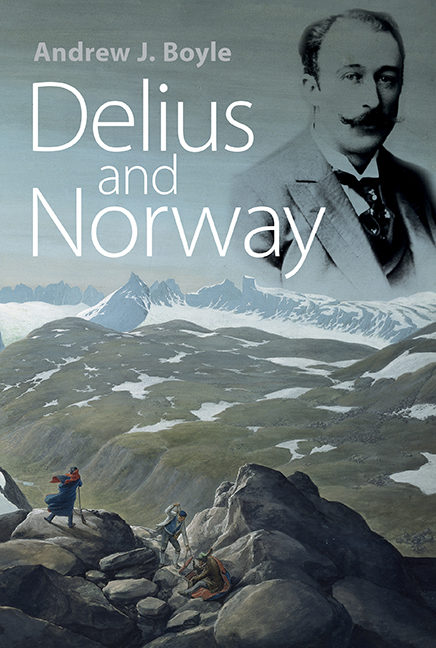Book contents
- Frontmatter
- Dedication
- Contents
- List of illustrations and tables
- Preface
- Abbreviations
- Selected glossary of landscape terms used in place names
- 1 Norway's awakening
- 2 1862–1888: Bradford, Florida and Leipzig
- 3 1888–1889: With Grieg on the heights
- 4 1890–1891: ‘C'est de la Norderie’
- 5 1892–1895: Norway lost
- 6 1896: Norway regained
- 7 1897: Front page news
- 8 1898–1902: Unshakeable self-belief
- 9 1903–1907: Breakthrough in Germany and England
- 10 1908–1912: Changes of direction
- 11 1912–1918: High hills, dark forests
- 12 1919–1934: Myth and reality in Lesjaskog
- Appendix I List of visits to Norway
- Appendix II Works with Norwegian and Danish texts and associations
- Selected bibliography and archival sources
- Index
10 - 1908–1912: Changes of direction
Published online by Cambridge University Press: 30 August 2017
- Frontmatter
- Dedication
- Contents
- List of illustrations and tables
- Preface
- Abbreviations
- Selected glossary of landscape terms used in place names
- 1 Norway's awakening
- 2 1862–1888: Bradford, Florida and Leipzig
- 3 1888–1889: With Grieg on the heights
- 4 1890–1891: ‘C'est de la Norderie’
- 5 1892–1895: Norway lost
- 6 1896: Norway regained
- 7 1897: Front page news
- 8 1898–1902: Unshakeable self-belief
- 9 1903–1907: Breakthrough in Germany and England
- 10 1908–1912: Changes of direction
- 11 1912–1918: High hills, dark forests
- 12 1919–1934: Myth and reality in Lesjaskog
- Appendix I List of visits to Norway
- Appendix II Works with Norwegian and Danish texts and associations
- Selected bibliography and archival sources
- Index
Summary
‘Et je m'en vais / Au vent mauvais’
from ‘Chanson d'Automne’, Paul VerlaineIn the life of Frederick Delius, 1907 was a momentous year. It has been called his annus mirabilis on account of the explosion of interest his music enjoyed in England. Also seen in the light of his connections to Norway, it was for the composer a transitional period, but for very different reasons. Norwegian friends such as Halfdan Jebe and Christian Sinding were moving out of his life and now Edvard Grieg, the artist whose music represented for Delius the irresistible pull of Norway, was gone. For the development of his career in the foreseeable future, only Germany and England mattered. With his success in England, the process that had been going on since Folkeraadet of redefining his relationship to Norwegian society was at an end. Hereafter, Delius would look to Norway for neither a professional network nor an audience.
This notwithstanding, Norway's place at the core of his creative life would become more secure than ever, through the persistent importance to him of Norwegian nature, and of the Norwegian folk character that thrived between the mountains. Indeed, in 1908–?the year after the English breakthrough – we see him driven by a compulsion to show his new English friends exactly where he found much of the inspiration for his works, where his creative spirit was renewed: in the light of Norway's summer nights, and in the loneliness of Jotunheimen's mountain plateaus.
Delius devoted the first half of 1908 to composition and to trips to England and Germany to hear his works, including the premiere of A Mass of Life in Munich. It was probably while in London in March that Delius spent some time with the renowned Norwegian cabaret singer Bokken Lasson. At the end of April she sent him tickets for her upcoming London concert and hoped that ‘you have not quite forgotten me’.2 By then, Delius was back in Grez and could not make use of them.
- Type
- Chapter
- Information
- Delius and Norway , pp. 215 - 245Publisher: Boydell & BrewerPrint publication year: 2017



